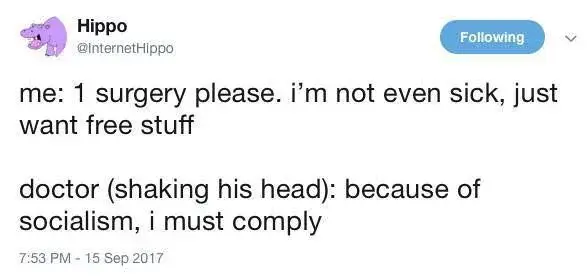I know this post is like a decade late and very boring, but I gotta post it anyway
Basically, with employer-sponsored health insurance the employer pays half and the employee (you) pays half. The cost of your insurance goes way down if you have a high deductible, and a deductible is basically what you’d have to pay before the insurance actually pays anything. So ‘high-deductible’ means you have to pay a lot before insurance pays anything, and it’s a lot cheaper to buy that insurance cause the insurers often just don’t pay anything ever. If it’s $5,000 before insurance pays a dime, often times you have to just pay as though you had no insurance. This is obviously bad, but it’s also cheap so like maybe you just luck out an never get sick or injured, right…?
Anyway, HSAs. Yeah, it’s called “Health Savings Account”. It’s marketed as a tax-advantaged, investor-y, bougie-“we’re comfortable” lifestyle way to really feel like a keen insider. Picture this: what if health insurance was individualized in the same way 401k and retirement stuff was, and you could “call your broker” at your “health savings account” to tell them to invest your tax-free “medical dollars” in the latest gizmo or whatever. Just deeply bad for solidarity and also very weird. And this is how basically everyone thinks about HSAs. A “tax-loophole” for the rich that I can also use because “I’m actually very financially savvy, just like the rich, who got where they are because of a weird hyper-individualized investment thing rather than any underlying systemic basis of societal organization”.
And you’re probably thinking: “But I already hate the suburban petite-bourgeois and their annoying mannerisms for reasons that are way less boring and meaningless.” Well you’re right, but also: high deductible plans are a requirement of HSAs so the employer’s half decreases significantly. Your employer doesn’t contribute to the HSA (they technically could, but if you’re reading this post they don’t [incredibly silly losing battle available there for libs]), so hopefully you do at least up to your deductible, but it’s pretty likely that’s not possible even if you had the money (no one does) because you literally aren’t allowed to due to contribution limits. (if people did have the money it would probably be better to get different / better / additional health insurance anyway.) But importantly and I guess obviously: nobody contributes to their HSA. It’s basically the chance for each person to individually manage an insurance fund for only themselves, which is almost exactly the same as paying out of pocket, the main difference being the additional bank account and a make-work program for MBAs. I’ve talked to almost a dozen office workers about this and they mostly have no idea what I am saying at all or say “yeah, I added money in onboarding, but I canceled it once I realized it came out of my pay.”
There’s no non-scam option btw if that wasn’t clear. And, yeah, obviously all health insurance is a scam, but this is a different scam run by a slightly different set of people (there’s def overlap though don’t get me wrong). The office job benefits world is basically a choice between varying levels of high-deductible plans + HSA (ie. $1.5k, $3k, $5k…) with maybe one ridiculously expensive low-deductible plan.
Anyway, thoughts? I needed to get this rant out, I guess. Maybe I just missed the discourse on this because I was a child at the time lol.
HSAs are not very useful for ordinary folks but for people who can afford to pay deductibles and stuff out of pocket it’s basically back door way of investing tax free after maxing the 401(k)
They’re a handout to rich people and fund managers basically
Given how small the limit is, is it even worth it if you are rich (not to say they don’t use it)? This seems much more useful for a well-paid blue collar worker who works a ton of overtime than someone making millions a year.
Yes absolutely. Rich dudes have financial advisors that do all this shit for them they don’t even have to think about it. Those little slivers add up
I mean, I said they do it anyways (well, I denied the negative, but same difference). It adds up, but given their tax rate is like 1% because of other means they use to hide billions, saving $40 in taxes a hardly worth the money they pay to someone to do that. OTOH, working people with saving $1000 in taxes get a lot more from it.
I think you can withdraw money from an HSA at age 59 or later tax free with no penalty to spend on another yacht or whatever.
Right. Basically if you’re in a position to max other retirement accounts and are relatively healthy, it’s a great option. Think tech bros and engineers in their 20s-30s making $100k-200k per year, not hedge fund managers with families.
HSAs + HDHPs can make sense in some circumstances, especially if your employer contributes to it and you are a high earner.
So in all health insurance plans, you’re working with pre-tax money. In all cases, your monthly premium is paid for in pre-tax money. With HSAs, additionally, any contributions you make are also pre-tax, and can be invested.
Whenever you’re dealing with pre-tax money, the more money you make, the more of an advantage this is. If you make very little money, you generally pay very little tax on it, so the discount from using pre-tax money is small. The reverse is true if you earn a lot of money.
The advantage of using the HSA is that you own the money and can keep it forever. You can always use it to pay for medical expenses without incurring taxes, and you can also start to draw from it after 65 as though it were a regular retirement account and pay the income taxes then. Because they roll over forever, you can amortize medical costs over a longer period of time. And because the money is invested, in theory it can increase without you doing anything.
The disadvantage of using an HSA is that it is invested. It’s entirely possible that the value of what you buy with your HSA money goes down, and then you have less money for medical expenses. Or if the arcane math of medical costs work out so that you’d have ended up paying less with a lower-deductible PPO or HMO.
tl;dr: If you make a lot of money, your company contributes to it, and you don’t get sick, an HSA is basically a free extra retirement account that can both always be used to purchase medical services and can lower your current year tax burden.
I’ll note that I’m super risk averse and so I have a traditional PPO, but one of my friends is a big money guy and he does an HSA (despite having lots of medical bills, he still swears by it).
HSAs are just tax breaks for wealthy people who are already paying cash for medical treatment
This tax break is too small potatoes for the wealthy to even bother with.
It’s the private HSA provider financial services companies that benefit.
I promise you the rich pick up every nickel they can get
Healthcare costs are significant and for the wealthy, paying for something with pre-tax money is like 40% savings. That’s significant to anyone, especially given the cost of receiving the benefit (next to nothing).
It’s $2k margin, I don’t think anyone would give a shit
Tbh until this comment I hadn’t realized that was a thing.
Its because health insurance is also a huge scam. So it makes economic sense to ditch insurance once you can pay cash for everything.
No one could explain was a deductible was to me until my late 20s. Probably because it makes no sense. I ALREADY paid you mfs, youre saying I still have to pay??
I guess a deductible is incentive to stop you from walking into the surgery place and saying:

definitely, because otherwise I would be getting elective wisdom teeth extractions every week
It’s absolute nonsense. I recently just figured out what the difference between a deductible, out of pocket maximum, and coinsurance was. This shit is so horribly complicated for no fucking reason. Hells, even after learning all of that, I still have no idea if my insurance is good or not.
This shit is so horribly complicated for no fucking reason. Hells, even after learning all of that, I still have no idea if my insurance is good or not.
No for no reason. They have to get as much money from you as possible while trying to limit how much you’re willing to use it because its impossible to know what you are going to be charged. And doctors and dentists will tell you that insurance covers things and then a month later send you bills.
And doctors and dentists will tell you that insurance covers things and then a month later send you bills.
I went to the doctors and my insurance paid for the visit. Cool. Expected since it was in network. Then a month later I get a letter saying I owe the clinic like $100 + $30 late fees because ooh sorry silly me I should’ve expected this random ass bill despite DESPITE signing a “no surprise billing” contract and no one and no app or receptionist explained I was going to pay again??
???
Turns out that in addition to the clinic visit, I also have to pay the specific doctor for his service??? Like a fucking tip??
Fucking annoying
I couldnt even figure out if my insurance was available in my state, so after a frustrating phone call with my mom I just chose not to buy any health insurance. Dental was cheap tho, thank god, otherwise I would have paid out the ass for my wisdom teeth extraction
You will like this video https://m.youtube.com/watch?v=-wpHszfnJns
I found a YouTube link in your comment. Here are links to the same video on alternative frontends that protect your privacy:
Relatedly: Matt Bruenig: The Welfare System Stole $2k From Me
This is a long rant about Flexible Savings Accounts, which are these ridiculous schemes that allow you redirect some of your untaxed paycheck into accounts that can only be spent on certain health care or child care items. To use them, you have to guess how much you are going to spend on those items during the year, and if you wind up wrong, you the money you put into the account is forfeited to your employer. Nearly half the people who use the accounts forfeit money to their employer ever year!
clarification is that FSAs do not roll over and HSAs do
ya i, cleverly or so i thought, squirrelled away enough money this year at the new job to cover me for a years of worth of (weekly? semi-weekly? i probably split the difference) psychotherapy appointments, which it appeared, despite what i think is pretty good health insurance, to require a non-deminimis copayment per appointment. free money, fuck the tax man, fund the the fsa. but, as it turns out, any telehealth behavioral apppointments are actually free on my plan, and i see my therapist by telehealth, so it’s all actually free, and so now ive earmarked thousands of dollars for the fsa which i now i have no plan for and only a small fraction will rollover at the end of the year.
so! will i get in a terrible car accident or be diagnosed with a terrible disease and be able to put that money to good use? or will i just buy the most expensive pair of oliver peoples glasses at the end of year, or buy a room full of diapers in a desperate attempt to prove to my ex i’m now reliable and responsible and good at money and planning (this being an unfortunate exception). time will tell!
If you ever want to take up bungee jumping, this is the year for you.
I am disabled so I think about it like a 15% deduction on the bajillion dollars a year I have to pay out of pocket. But it gives me the perverse thought that when I can get a coupon or discount on something, it makes me feel like I am “wasting” the money I put into the FSA.
But also I just spent two months rent to start laser hair removal and I might be able to reimburse some or all of that out of FSA funds.
Horrible horrible horrible fucking system.
I found a YouTube link in your comment. Here are links to the same video on alternative frontends that protect your privacy:
The HSA rhetoric was annoying because it was only useful to people who didn’t really need financial help, and even then the benefit was something like a tiny tax credit. I was offered one of these at an old job. I don’t remember if it was risk-free or not. I didn’t bother with it, one of my coworkers said you lose anything you don’t spend at the end of the year. No idea if that’s true.
FSAs are where you lose it all.
had one of those for 2 years. end of the year was like a spending spree on medical supplies to the point where i have a fully stocked store-like shelf in a closet like a prepper
of course they find ways for payments to not go through, etc so i always lost hundreds
HSA gets tossed into the stock market at the end of the year
deleted by creator
I believe that’s true—my dad bought me some CPAP cleaning thing I didn’t need because the money needed to be spent or given up
Also btw if you already have an HSA but then switch to a different job that doesn’t sponsor it, just take the tax hit to withdraw the money and close the account if you don’t have anything to spend it on. I found out a few months after I moved that my account has been getting dinged $4 a month for “administrative fees” and an extra dollar a month for paper statements that never got forwarded to me. Normally these fees would be paid by the employer.
what if health insurance was individualized in the same way 401k and retirement stuff was, and you could “call your broker” at your “health savings account” to tell them to invest your tax-free “medical dollars” in the latest gizmo or whatever.
Lmao. No way. You’re kidding right? HSAs are literally just investment accounts, but it’s just branded as being health related?
The cost of your insurance goes way down if you have a high deductible, and a deductible is basically what you’d have to pay before the insurance actually pays anything
I don’t get this shit at all lol. My health insurance pays like 85% of clinic visit fees. I’ve called them on multiple occasions and asked about my deductible. Apparently if I meet it, they’ll start paying 80% of my bills? But they literally already do! What exactly is the benefit here? Do they mean they’ll pay 80% of hospital procedures or some shit?
Yes. Which is a fuckton of money if you need surgery or something. 20% of a hundred thousand dollar procedure is more than I could afford.
If you are a very young homebody who is otherwise healthy, and you have decent future prospects for moneymaking, it might be worth your while to build up an HSA over time. Put it in S&P 500 and don’t fuck with it and by the time you’re old, you’ve got mad loot. Assuming wall street still exists in 50 years.
Pretty much yes. My current job offered me the choice between an HSA or a PPO, and once I read the terms of each the HSA came out looking so bad I wondered why they bothered offering the choice at all - but the monthly payment for the HSA is less, so I guess there’s my answer.
My place pushes that HSA hard. They have it automatically checked and highlight it as “Recomnended for your personal circumstances” and have a little section where they try to make it look great.
PPO is the way for most people to go
Trying to clear up confusion on what an HSA is:
If you have a high-deductible insurance plan, an HSA is an account where you can save money up to a limit without paying taxes on it (for now). It’s an investment account, which means that you shouldn’t get fucked by inflation if you keep money in it for a long time, but if you need to pull money out at the wrong time you can get screwed (not ideal for money meant for emergencies). Money in that account does not disappear at end of year, and can be left to a beneficiary if you die.
When you take money out of an HSA account, there are a few possible scenarios. If you use the money on a medical expense, you pay no taxes on this money. If you’re over 65 and use the money for a non-medical expense, you count the money as income for this year, essentially delaying you income taxes on that money. This is roughly equivalent to a 401k. If you’re under 65 and use the money for a non-medical expense, then you not only pay income tax on it but also a 20% fee. This is a very bad scenario.
If you’re going to save for retirement and you’re eligible for one, money in an HSA will likely end up being completely tax-free unless you save so much that you can’t spend it on all medical expenses. Unless you’re trying to micro-optimize, make all of your medical payments from the HSA so they’re tax-free.
HSAs are distinct from and mutually-exclusive with FSAs (except for a limited-purpose FSA, which you can have alongside an HSA). FSAs are much weirder, one reason being that the money disappears (IIRC goes to your employer) at end of year.
Well typically you’d have the option of like, paying $150 for a high deductible plan or $300 for a low deductible plan. If you paid $150 in premiums plus $150 to an HSA you’ve got the ability to save up for a big expense during years when your costs are lower.
Let’s say in the situation above, the high deductible is $3000 and the low deductible is $1000
If you pay 3600 in premiums and 1000 for a deductible that’s 4600 a year.
If you pay 1800 in premiums and 3000 for a deductible that’s 4800 a year, pretty close, but 1800 of your deductible is already saved in your HSA if you paid the equivalent of what your higher end monthly premium would be
but if you Don’t hit your deductible you can save for the upcoming year.
Yeah, what I’m saying is that from your jobs perspective you’ve halved the cost because they don’t pay the HSA portion. ($150/m instead of $300/m) So the employee in your example is paying for 75% of their medical costs rather than 50%.
My brother had a job where they choose between a high deductible plan + company match for HSA or a more expensive plan without HSA. After accounting for tax savings, employer contribution, and premium savings, you came out ahead with the HSA option even if you maxed out the deductible every year. Of course this assumes you are already getting your max employer match for 401k and can afford to do that.
Personally, I haven’t had a job that provides any sort of health benefits except being a student.
Just FYI, you can buy certain things with your HSA money if you have it, besides just healthcare services. For example you can buy first-aid supplies and stock up on trauma kits or street medic stuff.
It sucks because the healthcare system sucks, I ended up getting one because it just seemed like a good idea to sock some money away specifically for medical needs and I wasn’t planning on sticking with the company because the healthcare sucked. I didn’t think about the investing part, for me it was more just putting a fence around the money tax-free so I wouldn’t need to dip into savings for that stuff.
My employer contributes to my hsa. It’s two fifths of the deductible.
If you do have an hsa, there’s two schools of thought: the first is to never use it, roll the amount over your deductible into some kind of retirement account and use it as a tax dodge. The second is to use the shit out of it, hit all your deductibles every year and get the maximum utility out of the insurance you’re paying for or getting as compensation.











